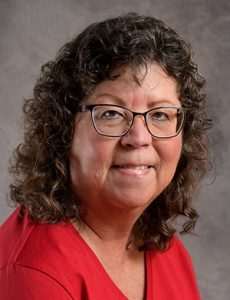Research in the Velpula-Tsung Lab isn’t the only potential breakthrough work taking place at the University of Illinois College of Medicine Peoria.
“Everyone says Peoria is a well-kept secret. We don’t want it to be a secret anymore,” said Kiran Velpula, PhD. “It’s time for people to know there’s active research going on here. It’s not like we have any less talent in Peoria. We have researchers here that have dedicated their lives to their work.”
Other promising research is being conducted around prostate, pancreatic and various pediatric cancers, stroke, Alzheimer’s, and other diseases and conditions.
- Work in the laboratory of Peter Gyarmati, PhD, centers on two novel approaches to reduce sepsis-associated deaths in people with leukemia. Specifically, the research includes developing new methods for detecting the pathogen that allows for timely and specific antimicrobial treatment, as well as uncovering and utilizing microbial metabolites to prevent sepsis from developing.
- Krishna Veeravalli, PhD, and his research team are working to discover novel targets that can be exploited to develop effective new treatment to reduce brain damage and facilitate functional recovery following a stroke. This research is being supported by the National Institutes of Health (NIH).
- Ken Fukuchi, MD, PhD, and Junling Yang, PhD, received a $5 million NIH grant to study Alzheimer’s disease, which afflicts about 6.5 million Americans age 65 and older. Their research focuses on the molecular and cellular mechanisms underlying Alzheimer’s risk factors associated with chronic and systemic inflammation and the development of new preventive and therapeutic strategies for the disease.
- Swapna Asuthkar, PhD, and her team are working to develop molecular targeted therapies for pediatric brain cancer (medulloblastoma) and prostate cancer. The team was the first to establish the function of the novel calcium channel protein, TRPM8, as a testosterone receptor, and is currently clarifying the role of TRPM8 in the cause of prostate cancer. Their work is anticipated to stimulate the development of TRPM8-targeted therapies for future clinical trials, with the goal of delivering effective treatment for patients with advanced prostate cancer.
- Intercellular mitochondrial transfer is a recently discovered phenomenon whereby mitochondria—responsible for energy production—is transported from one cell into a neighboring cell, something that occurs in different types of cancer cells. Sergey Malchenko, MD, PhD, and Bento Soares, PhD, are investigating the potential role of intercellular mitochondrial transfer in the malignant transformation of astrocytes—large, star-shaped cells that hold nerve cells in place and help them develop and work the way they should—located near brain tumor cells. For the first time, they found evidence that aggressive brain tumors can re-program neighboring astrocytes into tumor-associated astrocytes through mitochondrial transfer, a finding that may lead to new, targeted therapies.
- Several faculty in the Department of Pediatrics are engaged in pediatric oncology research. Amber D’Souza, MD, has an interest in pediatric liver cancer and studies its biology and avenues for new treatments. Manu Gnanamony, PhD, works on neuroblastoma. Pedro de Alarcon, MD, studies platelets, which are important for clotting, and how they function in different stages of disease.
- Outside of oncology, Billy Wang, MD, is studying traumatic brain injury and new treatments. Amy Christison, MD, in collaboration with Gyarmati, is studying the composition and function of the gut microbiome in children with obesity and why gut germs increase excess weight gain and the risk of diseases such as diabetes, heart disease and high blood pressure.
- The lab of Christopher Gondi, PhD, is involved in research aimed at improving the sensitivity of cancer cells, specifically pancreatic cancer cells with an emphasis on identifying key mechanisms that lead to therapy resistance. The goal is to reduce the toxicity of available therapies so that patients can have a better quality of life. Gondi’s lab, in collaboration with University of Illinois Urbana Champaign’s (UIUC) computational research and OSF HealthCare, is developing an artificial intelligence-based algorithm to help in early detection of cancers, which leads to earlier interventions with better outcomes.
- The internal medicine and neurology departments at IUCOMP are collaborating with UIUC and OSF HealthCare to examine migraines and early diagnosis of autism spectrum disorder (ASD). Gondi is working with Hrachya Nersesyan, MD, PhD, and Yelena Nersesyan, MD, PhD, to develop tools for better migraine diagnosis and management. Research work led by Lusine Demirkhanyan, PhD, is focused on improving early diagnosis of ASD through artificial intelligence technologies, in conjunction with a biological test.

Lisa Coon
is a Peoria native who had a long career in the newspaper industry before moving into marketing and communications




